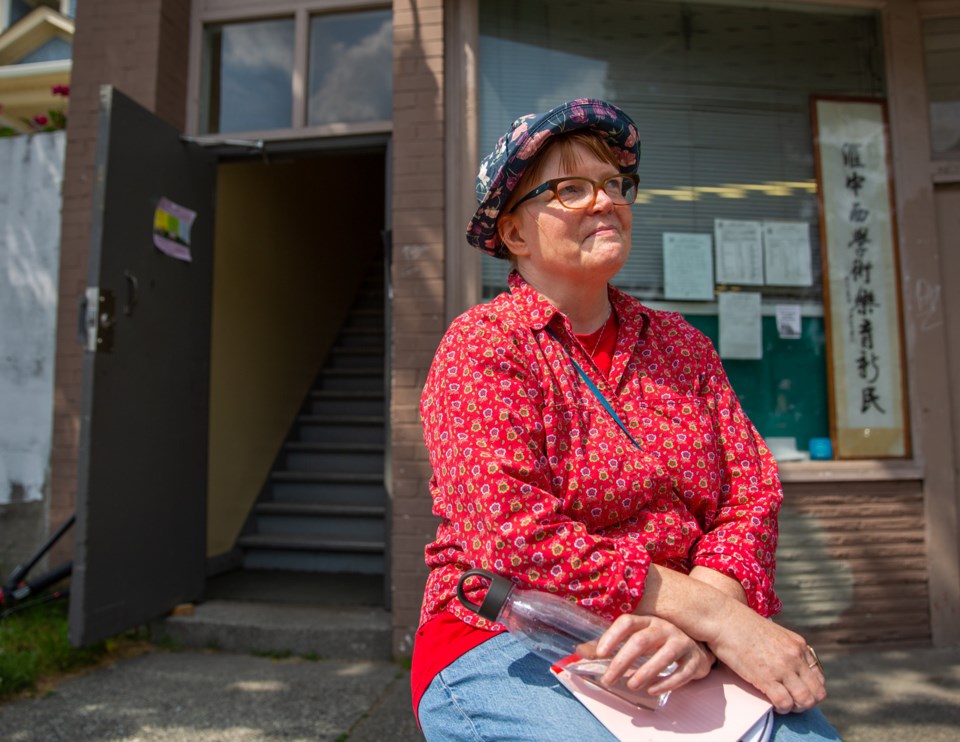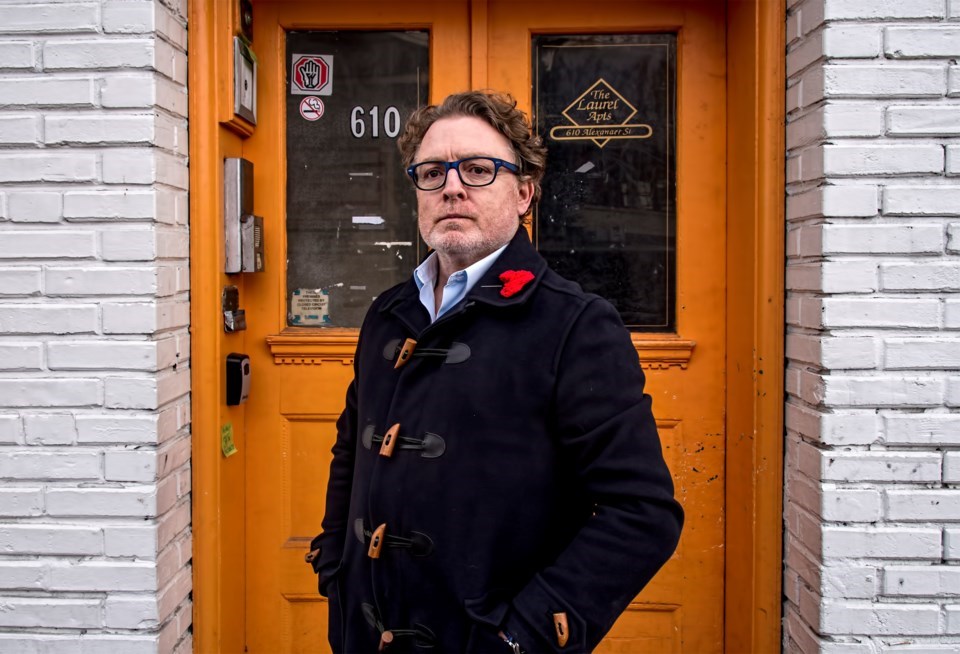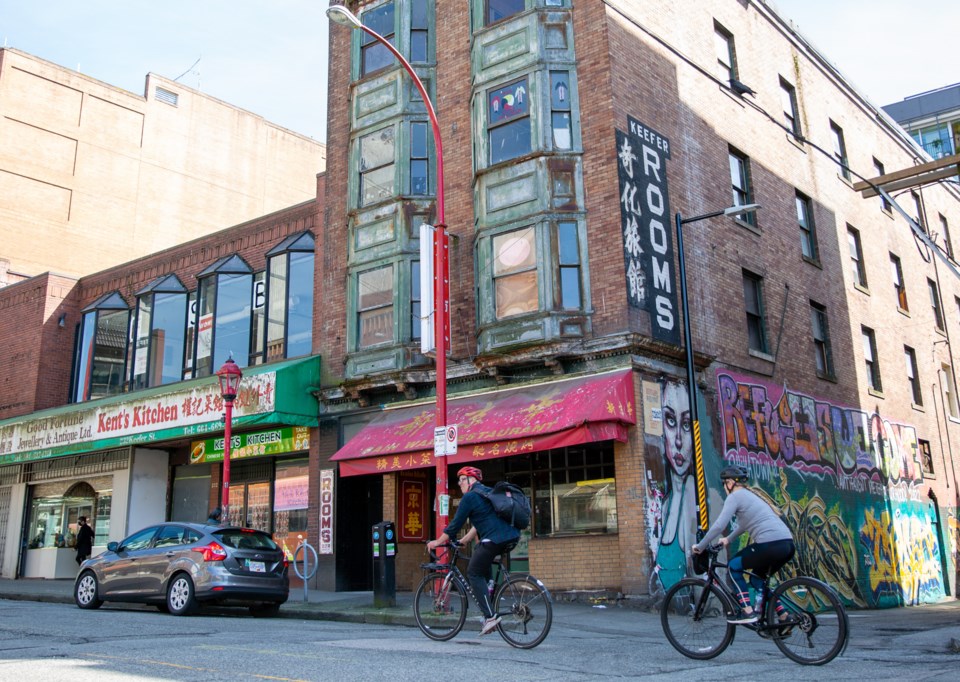The B.C. government has paid $8.2 million for a Chinatown single-room-occupancy (SRO) hotel that remains vacant after a fire in September 2022 forced the displacement of tenants and the closure of a popular restaurant on the building’s ground floor.
The deal to purchase the 48-unit Keefer Rooms in the 200-block Keefer Street and the space once occupied by the Gain Wah restaurant includes a $3-million commitment from government to renovate the century-old building.
“By purchasing this property on Keefer Street, we are taking steps to prevent homelessness before it begins by preserving valuable low-income housing and partnering with organizations that will provide additional support to those who need it,” Housing Minister Ravi Kahlon said in an Oct. 17 news release.
The organizations include the Downtown Eastside Community Land Trust association, which government said was instrumental in bringing forward the proposal. The Land Trust will operate the building with assistance from the former owner’s management team.
The DTES SRO Collaborative will oversee tenant-led initiatives and programs such as room cleaning and repairs, cultural reconnection, harm reduction and fire safety.
Earlier this year, the provincial government announced a one-time $11-million grant to the Collaborative to help SRO tenants in several buildings access improved services and supports.
'Championing community ownership'
The government’s agreement with the Land Trust is unique because the association could one day own the building for a nominal fee. The goal of the Land Trust is to add buildings to its portfolio and keep them from being redeveloped into more expensive housing.
Or as Norm Leech, board chair of the Land Trust association, put it in the government’s news release — “protecting property from the private market and championing community ownership in the DTES.”
The challenge of meeting that goal was outlined in a city staff report to council in May: the average rent in privately run buildings soared 21 per cent in four years, with others lost to fires, demolition and redevelopment.
The Lotus Hotel, for example, has seen some low-income tenants take buyouts from the Toronto-based owner and then have their rooms renovated to be rented to a new tenant for $1,900 per month.
Rooms renting at the income assistance shelter rate — which was boosted to $500 this year after 16 years at $375 — are scarce, with the staff report pointing out that since 2003 the number of privately owned and operated rooms at $375 decreased from 1,700 to 52.

'Gentrification'
Wendy Pedersen, executive director of the Collaborative, said in an interview that she and others in the Downtown Eastside have been meeting for three years to create a strategy to protect SRO stock.
“We saw the crisis of what's happening with the privately owned hotels, and we saw that we're losing them to gentrification or deterioration,” Pedersen said.
“Everybody is really on board to come up with another pathway for SROs that aren't just supportive housing. So there's an appetite in the community for something different.”
Pedersen praised the provincial government for purchasing the Keefer Rooms and agreeing to have the Land Trust operate the building, along with involvement from the Collaborative, which has been in regular contact with former tenants of the Keefer.
She said tenants in SROs are seeking stability in an unstable housing market.
“It's not going to happen if there's this constant churn of people out onto the streets, and it's not going to happen if there's this constant churn of ownership,” Pedersen said. “We need to find a way for the landlords to transition gracefully.”
For years, she has pushed all three levels of government to invest in SROs and put them in public hands. It’s a belief shared by the now former owner of the Keefer Rooms, who owns seven other SROs in the Downtown Eastside, including the West Hotel and Hotel Empress.

'Prepared to take the leap'
Christopher Wall has said in previous interviews with Glacier Media that government needs to make substantial investments in the purchase of private SROs and that they should all be in the public domain.
Wall reiterated that view in an interview Tuesday.
“Everything has gone up and our expenses are huge — taxes, insurance, cost of borrowing,” he said, noting his mortgages have increased from three per cent to seven per cent. “So it's impossible to run these buildings at $600 a month rent.”
Wall said rent at his buildings range from $450 to $1,150, with rents at the Keefer — before a kitchen grease fire closed it down — at $500 to $650. All tenants displaced by the fire ended up in some of Wall’s other buildings, with some eager to return to the Keefer, which is expected to reopen in 2025.
'Empty shell'
Wall said most of the damage from the fire was related to water destroying drywall and floors. The building has been cleaned out, with the restaurant space essentially an “empty shell,” he said.
“The province now has a great asset,” he said. “Tenants are going to be able to move into a building that's completely renovated and brought up to code and presumably have rents that are in line with the cost of living that's allocated to them for their monthly rental benefits.”
Wall said he continues to negotiate with the provincial government to purchase his seven other SROs. At the same time, he said, other investors are interested in his portfolio, with two developers approaching him eight months ago about purchasing the Keefer Rooms.
“To protect this Downtown Eastside housing, which is so valuable to the province, they need to start making a move on the stuff that's occupied,” he said.
“The provincial government hasn't proven that they're prepared to take the leap, and to purchase buildings like the Empress and the West, and the Avalon and the Arlington — to go in and preserve the housing that's occupied.”
Added Wall: “If someone came along and offered me 25 million bucks for the West, I'm out. And the government would have no control over that.”
Gain Wah project
The Gain Wah restaurant, meanwhile, is expected to reopen in some form.
A coalition is working to get the restaurant open again as a social enterprise and community gathering space in Chinatown, which has seen an increase in expensive restaurants and cafes.
“This is a unique opportunity for the community to collectively honour the history of Gain Wah and to imagine — and realize — a diversity of possibilities for an innovative food hub that serves residents of the overlapping Chinatown and Downtown Eastside neighbourhoods for years to come,” according to information posted on the “Gain Wah Project” website.
“Together, we are committed to facilitating a process to rebuild a new Gain Wah that is created by and for the community.”





